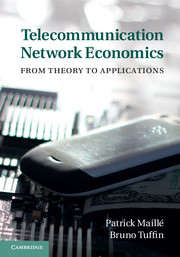Book contents
- Frontmatter
- Contents
- Preface
- 1 Introduction: telecommunications evolution and the set of actors
- 2 Mathematical foundations: optimization, game theory, auctions
- 3 Economics of access service providers
- 4 Economics at the content and application level
- 5 Interactions among network service providers
- 6 Interactions among content or application service providers
- 7 Relations between content/application providers and access service providers
- References
- Index
2 - Mathematical foundations: optimization, game theory, auctions
Published online by Cambridge University Press: 05 April 2014
- Frontmatter
- Contents
- Preface
- 1 Introduction: telecommunications evolution and the set of actors
- 2 Mathematical foundations: optimization, game theory, auctions
- 3 Economics of access service providers
- 4 Economics at the content and application level
- 5 Interactions among network service providers
- 6 Interactions among content or application service providers
- 7 Relations between content/application providers and access service providers
- References
- Index
Summary
The goal of this chapter is to provide the economic vocabulary and the analytical tools that will be used throughout the book. We do not intend to be exhaustive here with regard to the problematics of optimization, game theory, or auctions; instead we focus on the minimal material that is needed to understand the derivations in the next chapters, and provide illustrations of those concepts and methods by presenting concrete examples. We will, however, indicate appropriate references for the reader interested in developing those aspects more deeply.
The chapter first introduces some key criteria used to quantify the economic performance of a situation from the point of view of an individual actor, of a group of actors, or of the system as a whole (Section 2.1). Then the emphasis is put on the mathematical tools and results that will be needed in order to characterize the specific outcomes obtained when optimizing such performance criteria (Section 2.2). When different stakeholders seek to optimize their own objectives through some decision, the resulting outcome can be suboptimal for all of them, due to their interactions. The analysis of those interactions and their consequences is the object of game theory; we provide the general framework of game theory and specify several types of games that will be of interest in this book (Section 2.3).
- Type
- Chapter
- Information
- Telecommunication Network EconomicsFrom Theory to Applications, pp. 24 - 87Publisher: Cambridge University PressPrint publication year: 2014



